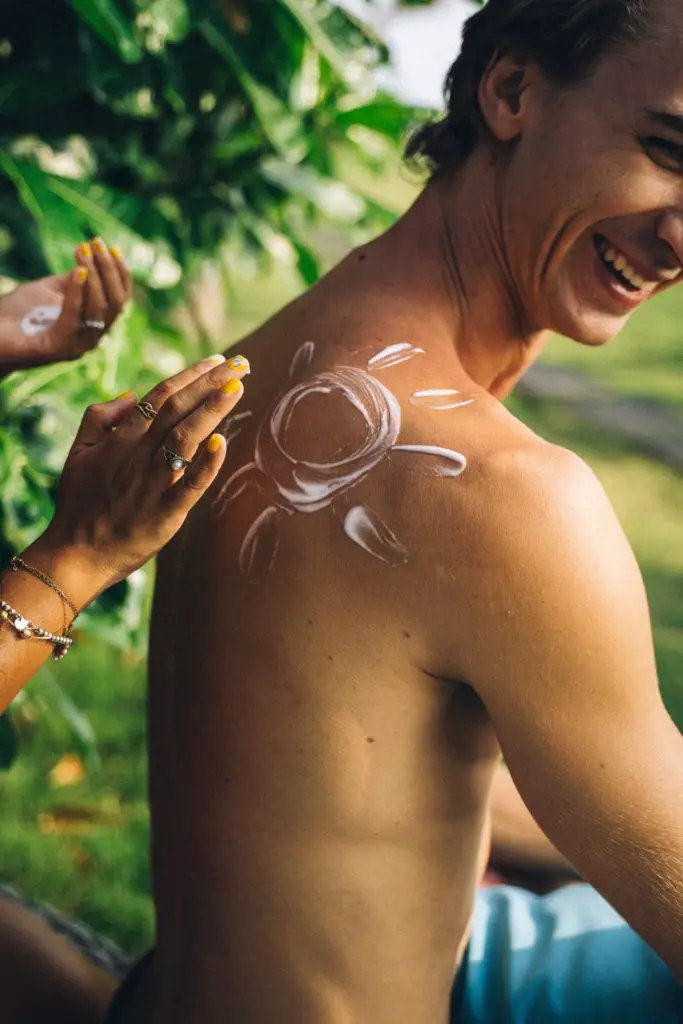Sunscreens should be applied on both the body and face. They come in various outward appearances and formations such as lotions, gels, sprays, and sticks. You can choose depending on your preferences.
Sunscreens have different ranges of SPF from 15 – 100
SPF stands for sun protection factor which is the amount of time your skin will need to burn when using the sunscreen. It is a measure of burn time.
For instance, applying an SPF 50 sunscreen means that it takes the sun 50 times longer to burn your skin than if you were not wearing any sunscreen at all. This also applies to the other SPF numbers.
Dermatologists have recommended the use of SPF 30 and higher daily.
Two Main Categories of Sunscreen
Chemical – They are also called Organic sunscreens. They include Oxybenzone, Octinoxate, Avobenzone, and Homosalate. Chemical sunscreen absorbs into the skin quickly. They are usually water-resistant and lightweight.
Mineral – They are also called Physical or Inorganic sunscreens. They include Zinc oxide and Titanium dioxide. Mineral sunscreens are mild on the skin and are more unlikely to cause any skin reaction or irritation. They are also thicker which makes them harder to blend into the skin and ends up leaving a white cast.
Benefits of Applying Sunscreen
It helps with hyperpigmentations, dark scars, discoloration, and sunburns, allowing you have a smoother even skin tone. Reduces harmful UVA rays and prevents skin cancer. It reduces the signs of premature skin aging like wrinkles and sagging skin.
Tips on Applying Sunscreen
Apply a generous amount of sunscreen on your face and entire bodyUse sunscreen daily whether you are indoor or outdoor. Also, make sure to reapply every two hours when you are outdoors. Apply Sunscreen at least 20-30 minutes before stepping out into the sun so it can be well absorbed into your skin. Be cautious when applying sunscreen on your face to avoid it getting into your eyes. Use waterproof sunscreens with at least 30 SPF.
List of the Best Sunscreens on the Market.
Missha All-around Safe Block Aqua Gel SPF 50+
Key Features
It is a lightweight sunscreenIt is highly moisturizing It contains SPF 50+
Altruist Dermatologist Sunscreen SPF 50
Key Features
It is water-resistantIt is non-stickyIt is fragrance-freeIt contains SPF 50It is hypoallergenicIt is suitable for dry and sensitive skin
CORSX Aloe Soothing Sun Cream SPF 50
Key Features
It is lightweight and hydrating. It is suitable for sensitive skin and it is also fast-absorbingIt contains SPF 50It does not leave white casts
Cetaphil Daily Facial Moisturizer with Sunscreen SPF 50
Key Features
It is suitable for dry to normal, sensitive skinIt is fragrance-freeIt is non-greasyIt does not clog poresIt fights against five signs of skin sensitivity which include; irritation, dryness, tightness, roughness, and weakened skin barrier. It contains SPF 50+It is hypoallergenic
Gavia Sunblock and Whitening Cream SPF 60
Key Features
It is oil-freeIt contains UVA/UVB protectionIt contains SPF 60It is a dual-action sunblock and skin whitening cream
Neutrogena Hydro Boost Water Gel SPF 50
Key Features
It is water-resistant It has broad-spectrum SPF 50 sun protectionIt keeps the skin hydrated for up to 8 hoursIt is oil-free and non-greasy
Disaar Sunblock SPF 90
Key Features
It is oil-free sunblock protectionIt is lightweight, thin, and has a natural textureIt contains SPF 90It contains plant extracts and antioxidants
Black Girl Sunscreen Broad Spectrum SPF 30
Key Features
It is ultra-sheerIt leaves no white residueIt is free of fragranceIt contains broad-spectrum SPF 30It is water-resistant (80 minutes)It does not contain oxybenzone and octinoxateJojoba and avocado are active ingredients
La Roche-Posay Anthelios Ultra Fluid SPF 60
Key Features
It is lightweightIt has a matte finish fluidIt is ideal for sensitive skinIt does not contain oilIt does not contain oxybenzoneIt is paraben-freeIt is fragrance-freeIt is non-comedogenic
Neutrogena Ultra Sheer Dry-Touch Oxybenzone-free Sunscreen Lotion Broad Spectrum SPF 70
Key Features
PABA-freeIt is water-resistant (80 minutes)It is non-comedogenicIt is lightweight It has a non-greasy feel
Conclusion
Sunscreens are one of the best skin care decisions you can make for your skin.
Use them religiously and you would reap the benefits
Also, note that sunscreens should not be used on infants less than 6 months.
The best way to protect your skin is to reduce your time in the sun as much as you can and ensure you stay protected with sunscreen.
How much SPF is enough for the face?
Apply a generous amount of sunscreen on your face and ensure you apply thoroughly and adequately to ensure maximum protection.
Can sunscreen damage your skin?
Sunscreen protects the skin rather than damage it. To reap the full benefits of sunscreens, ensure you apply them every day and use them thoroughly.
Is it ok to wear sunscreen every day?
Yes, it is okay to wear sunscreen every day. Your skin needs daily protection from harmful UV rays.
How do I choose a sunscreen?
Choose a sunscreen with a broad spectrum (protecting from both UVA and UVB rays) and SPF, not less than 30.
